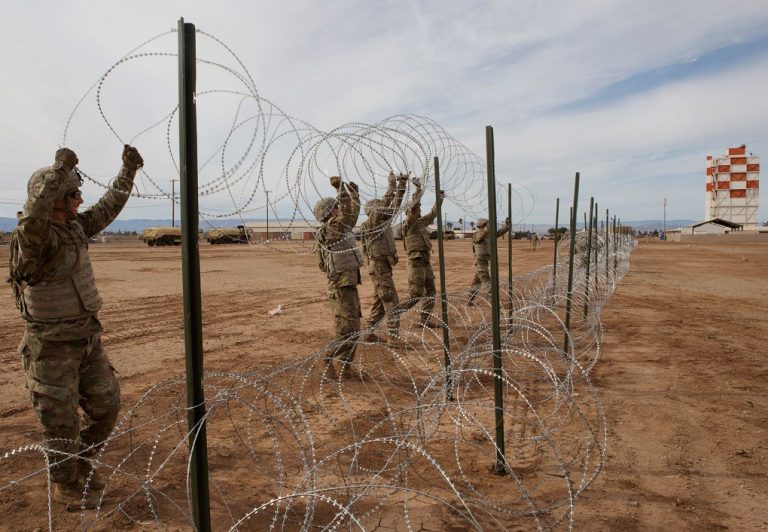Defense Department civilians can now apply for details of up to six months with the Department of Homeland Security to help support President Donald J. Trump’s priority of securing the southern border.
DOD civilians were notified of the opportunity via email Aug. 20. Civilians who would like to contribute to the southern border mission can do so by applying at the USAJOBS website. Following that action, DHS will review applications and initiate coordination with an employee’s organization to get approval for a detail to U.S. Immigration and Customs Enforcement, U.S. Customs and Border Protection or the Federal Emergency Management Agency.
Already, nearly 500 DOD civilians have signed up to participate and bring their skill sets to the border security and immigration enforcement mission at the participating DHS agencies. Michael A. Cogar, the deputy assistant defense secretary for civilian personnel policy, said he hopes even more will volunteer to participate in the program.
“I hope that we can get as many [general schedule] civilians as possible to volunteer for this critical mission,” Cogar said.
Participating in a detail to the participating DHS agencies requires supervisor approval, but Cogar encourages supervisors across the department to work hard to find ways to make it possible for their employees to volunteer.
“I would ask the supervisors to take a hard look at what they can and can’t accomplish with their employees,” he said. “This mission is truly critical, not just for DHS, not just for DOD, but for the entire country. Any individual, any one person, can have a force multiplying effect for those DHS agents, allowing them to focus on what they do best, while we can provide that technical support that they need to be on target, on mission and out there every day focused on the safety of our nation.”
According to Cogar, all appropriated fund DOD civilian employees in good standing, who have served with their current agency for more than 90 days and who are not on a probationary period, are eligible to volunteer for the detail.
Those assignments will be mostly in border states and require travel, though other duty locations are currently being identified by participating agencies, he said.
The DHS agencies, Cogar said, are looking to tap into some of the skill sets that DOD civilians possess to help them with operations at the southern border and with internal immigration enforcement.
“Department civilians are technical experts across multiple fields, and they are waiting to be called to support this absolutely critical and necessary mission,” he said.
Included among those skills, Cogar said, are those related to, among other things, transportation security, data input and analysis, targeting and intelligence analysis, firearms, corrections, detention and prisoner processing, linguistics, case processing and human resources.
While on detail, he said, DOD civilians will be involved with data entry, operational planning support, processing and throughput logistics, and logistical support. Law enforcement functions will not be among the roles performed.
Right now, the agreement between DOD and DHS lasts until Sept. 30, 2026, and DOD civilians can be detailed up to 180 days. During their time on detail to the participating agencies, they will continue to receive the same pay and benefits they earn during their regular DOD jobs.
While with the participating agencies, they will also be eligible for overtime and premium pay. But DOD civilians who choose to participate in the detail will get more than just regular pay and benefits — they will be able to enhance their careers, Cogar said.
“This is an opportunity for them to receive additional training,” he said. “They’re going to get professional development and cross-functional expertise. Also, they’re learning how to work with partner agencies. The experience gained from working in a multi-agency cross-country operation could be considered on their next performance evaluation.”
DOD civilians aren’t the only ones who can now apply to assist DHS in protecting the nation’s southern border. Since June, the department has also offered retiring and separating service members the opportunity to work for DHS through the SkillBridge program.
As part of that effort, directed by Defense Secretary Pete Hegseth, military departments are encouraging service members considering participation in the SkillBridge program to seek internships, apprenticeships or on-the-job training with DHS. Like civilian details, those SkillBridge opportunities last up to 180 days.
Meeting the president’s goals for the southern border will require a whole-of-government approach, and DOD civilians can be a part of that mission, Cogar said.
“This is a national security problem, and our civilians have the critical skill sets to support DHS in their mission,” Cogar said. “We’re proud that our civilians are already willing to sign up.”
Source: U.S. Department of Defense, August 2025
Click this link for the original source of this article.
Author: C. Todd Lopez – U.S. Department of Defense
This content is courtesy of, and owned and copyrighted by, https://americanmilitarynews.com and its author. This content is made available by use of the public RSS feed offered by the host site and is used for educational purposes only. If you are the author or represent the host site and would like this content removed now and in the future, please contact USSANews.com using the email address in the Contact page found in the website menu.





